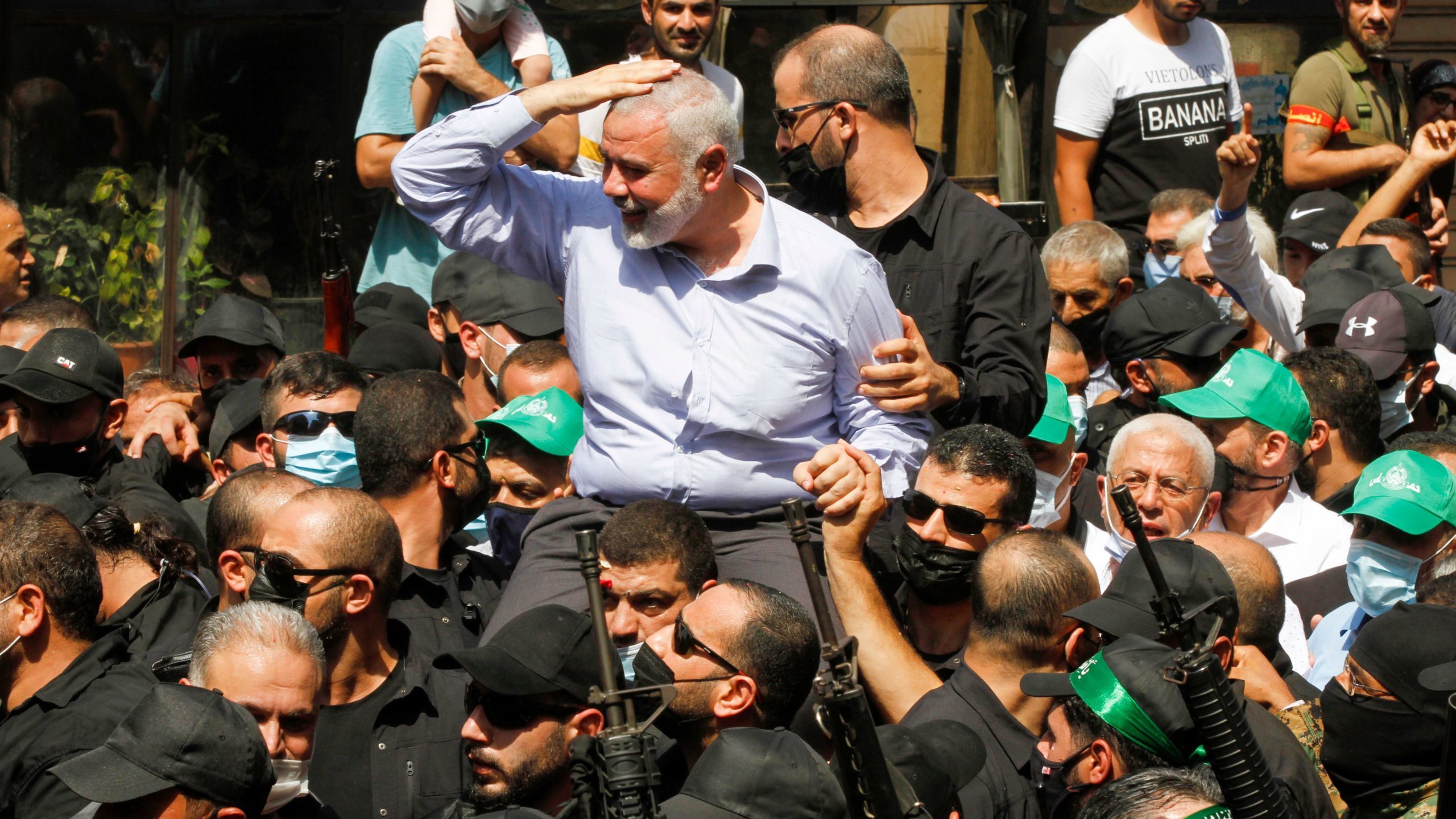Hizbullah, Hamas Chiefs Discuss Israel-UAE Deal (with VIDEO)
Haniyeh’s visit to Lebanon infuriates many locals, worries Abbas
Hamas leader Ismail Haniyeh met in Beirut on Sunday with the head of Lebanon’s Hizbullah movement, Hassan Nasrallah, to discuss the agreement to establish diplomatic ties Israel and the UAE signed last month.
The two leaders talked about “political and military developments in Palestine, Lebanon and the region” and “the dangers to the Palestinian cause” including “Arab plans for normalization” with Israel, Lebanese media close to Hizbullah reported.
Hamas and Hizbullah have a history of cooperation. Hamas has learned a lot from Hizbullah’s doctrine and building offensive attack zones; Hamas has learned a lot about firing rockets − it models its elite unit on Hizbullah.
Yaakov Lappin, a research associate at the Begin-Sadat Center for Strategic Studies at Bar-Ilan University, near Tel Aviv, told The Media Line the meeting shows that Hamas is intent on finding allies in the region, as the group is “still experiencing a high level of isolation.”
The two groups have many things in common, with the most prominent being their backer, he says.
“Hamas and Hizbullah have a history of cooperation. Hamas has learned a lot from Hizbullah’s doctrine and building offensive attack zones; Hamas has learned a lot about firing rockets − it models its elite unit on Hizbullah. These two have been cooperating for a number of years,” Lappin says.
But he adds that there is an important “nuance” to the Iran factor.
“Hizbullah is explicitly a proxy of Iran, while Hamas is an ally of Iran and it has enjoyed Iranian support for many years. But it’s not a proxy, it’s within the Iranian orbit.”
Hasan Awwad, an expert on Palestinian politics, told The Media Line that the Gaza Islamist group is trying to stay relevant. “Many Gulf states have abandoned Hamas and cut off financial aid and have publicly criticized it.”
Hamas is “desperate” and looking to keep communication channels open with as many parties as possible, Awwad says.
Hizbullah is in trouble domestically, regionally and under tremendous pressure internationally, and Ankara is trying to use its ally Hamas to get closer to Hizbullah, to increase its control over Lebanon
Prof. Efraim Inbar, president of the Jerusalem Institute for Strategy and Security, argues that this is related to the growing Turkish presence in Lebanon.
“Hamas is a Sunni Islamist group with military capability and is close to another regional power,” Inbar says. “Its relationship with Turkey has something to do with the meeting.”
Following the catastrophic explosion in Beirut last month, Turkish Foreign Minister Mevlüt Çavuşoğlu visited Lebanon and offered his country’s unconditional support.
Inbar says Hamas’ actions regarding the Land of the Cedars are a continuation of Ankara’s policy.
“Hizbullah is in trouble domestically, regionally and under tremendous pressure internationally, and Ankara is trying to use its ally Hamas to get closer to Hizbullah, to increase its control over Lebanon,” the professor says.
Before Haniyeh met with Nasrallah, thousands of people gave him a hero’s welcome, carrying him on their shoulders at Ain al-Helweh, Lebanon’s largest Palestinian refugee camp.
The Hamas leader spoke highly of his group’s military capability, warning that its military arm has advanced weapons.
“Not long ago, our rockets only reached [targets] meters from Gaza’s borders. Today, the resistance in Gaza possesses rockets that can reach Tel Aviv and beyond Tel Aviv.”
These statements, and the reception he received at the refugee camp, infuriated many Lebanese. Activists on social media expressed anger at Haniyeh’s statements, which they consider dangerous and a threat to the security and stability of their country, which is already suffering from a stifling economic crisis.
Fares Saeed, a former member of the Lebanese parliament, thinks the threats Haniyeh issued from Beirut endanger his country.
He explained in a tweet that the remarks signal the return of Palestinian military action to Lebanon after its end in 1982, under the cover of Hizbullah.
Tehran seeks to hold onto the “camps card” to advance its interests, even though that same card in Syria failed to achieve its goals, Saeed explains.
Journalist Michel Qanboor tweeted sarcastically: “The miserable camp receives the conqueror of Jerusalem, riding on the ‘cause’ the same way he’s riding on the back of people.”
Analysts say the enthusiastic reception Haniyeh received in Beirut is worrying Abbas in Ramallah.
“Abbas has always been concerned about the threat that Hamas poses for him, first and foremost in the West Bank,” says Inbar. “Hamas is always trying to undermine Abbas’ authority.”
Awwad agrees, saying the Hamas leader’s warm reception should not be a surprise because under Abbas, Fatah has ignored the Palestinian refugee camps.
“It makes sense that this power struggle extends to the Palestinians in the diaspora. Abbas’ Fatah party is losing ground; they don’t seem to care about Palestinians in the refugee camps.”
From Ramallah, Ahmad Majdalani, a member of the executive committee of the Palestine Liberation Organization (PLO), told The Media Line that Haniyeh’s visit to Lebanon is part of “talks among Palestinian factions” aimed at improving relations.
“The goal is to have a new start and end the division. And Haniyeh’s reception in Lebanon doesn’t worry us.”
On Sunday, US Secretary of State Mike Pompeo told Fox News that Israel and the United Arab Emirates could soon reach an agreement to form an anti-Iran alliance, designed in part to protect American interests in the region.
Lappin says the possible new coalition worries Tehran.
“Iran is alarmed by the formation of a strategic Middle Eastern alliance that consists of Israel and moderate Sunni countries that are threatened by the Iranian hegemonic agenda. Iran is trying to push back and [demonstrate that] it has a regional system of its own and a regional influence, to show that it is not isolated and that it has a network of forces in the region that answers to it and promote its agenda,” he says.


